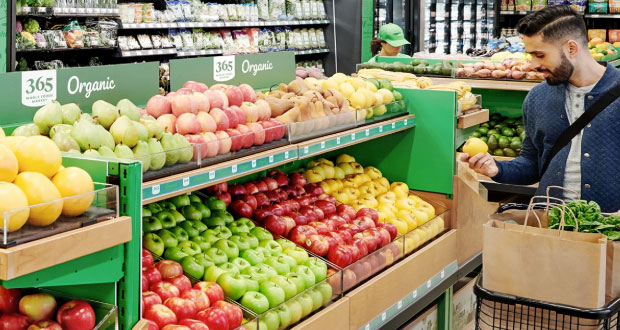Amazon on Tuesday opened its first large-scale fully automated Amazon Go grocery store in Seattle.
The 7,700-square-foot store offers baked goods sourced locally, fresh seasonal produce, meat, seafood, and ready-made meals, as well as beer, wine, and spirits.
There are no cashiers. To make purchases, shoppers need an Amazon account and the free Amazon Go app from the Apple App Store, Google Play, or Amazon Appstore. The app can be downloaded onto a recent-generation iPhone or Android phone. They use a QR code from the app to enter the store.
Sensors and overhead cameras track everything placed in or taken out of shopping carts. Amazon uses machine learning and artificial intelligence to enhance the shopping experience.
Amazon reportedly plans to open more such groceries and is rumored to be fully automating stores in its Whole Foods chain.
“In retail where margins are tiny, automation removes two main headaches: labor scheduling and shrinkage,” noted Rebecca Wettemann, principal at Valoir.
“Tech doesn’t call in sick or not show up at all, and it doesn’t steal,” she told the E-Commerce Times.
The future of retail “relies less on employees but more on technology to automate, personalize, and provide security and safety,” said Ray Wang, principal analyst at Constellation Research.
“Every retailer is worried about labor costs and the amount of mishandling at checkout and is looking at ways to increase revenue per square foot,” he told the E-Commerce Times.
Making Shopping Fun
Customers abandon carts or shorten shopping trips because of long checkout lines, costing retailers in the United States “tens of billions in sales,” observed Michel Wedel, PepsiCo Chair in Consumer Science in the University of Maryland.
He told the E-Commerce Times that the resulting consumer dissatisfaction also “negatively affects the probability that they return and their store loyalty.”
A recent Yotpo survey found that more than one-third (36.5 percent) of shoppers said they would spend more on products from a brand they were loyal to even if they were cheaper elsewhere, and almost 60 percent said they would refer friends and family to that brand.
By reducing checkout times and improving the customer experience, automated stores potentially increase retail sales, Wedel said.
Using the Amazon Go app to enter the grocery store lets Amazon track customers’ locations in the store, their time spent there, and considerations and purchases, Wedel pointed out. “This makes it possible to deliver personalized discounts and recommendations based on customers’ data.”
This data collection also allows delivery of in-store augmented reality applications on customers’ mobile phones to present interactive information such as recipes, he said.
“Cashierless checkout has the potential to merge the mobile and brick-and-mortar shopping channels,” Wedel remarked.
Spinning Gold With Go
Amazon has opened at least 26 Go convenience stores in Seattle, Chicago, San Francisco, and New York City since January 2018.
Amazon’s Go convenience stores could be a US$4 billion business by 2021.
The Cashierless Gold Rush
Companies working on autonomous technology for cashierless stores abound, and retailers of all sizes are working on going cashierless.
Earlier this month, 7-Eleven piloted its first cashierless store, for employees only, at its corporate headquarters in Irving, Texas.
It offers an experience similar to Amazon’s automated stores. Customers download a 7-Eleven app, which provides a QR code that lets them enter the store and make purchases. 7-Eleven uses custom-built technology developed in-house.
Two cashierless stores opened in California in August 2018: Inokyo’s prototype autonomous retail store in Mountain View, California, and Zippin’s autonomous store in San Francisco. Zippin plans to open another in Sacramento’s Golden 1 Center arena.
Another cashierless store — Standard Market — opened in San Francisco in September.
Sam’s Club began piloting a cashierless store in Dallas in October 2018.
Pittsburgh-based food, fuel, and pharmacy retailer Giant Eagle began piloting a cashierless solution at one of its locations last July.
The California-based Loop Neighborhood Market convenience store chain last month opened an autonomous convenience store and gas station in Campbell, California, using technology from Santa Clara, California-based AiFi.
It plans to open more of these “nanostores,” and will implement the Aifi Autonomous Store Platform in its existing convenience stores.
AiFi claims its automated retail solution can scale from a mom-and-pop shop all the way to a large retail store.
The Pros and Cons of Going Cashierless
Going cashierless is not necessarily applicable to all kinds of stores.
“For commodity goods like staples, it makes sense to move to this model, “Valoir’s Wettemann said, “but anyone who’s tried automated checkout with special items knows sometimes humans are needed.”
On top of their other benefits, autonomous stores let management spend more time focusing on merchandising and in-store promotions, Constellation’s Wang said.
However, he pointed out, “You’ll need more technology investment up front, and it’s less personable.”
Also, there could be a higher theft risk.
“Walmart has abandoned cashierless checkout in a large number of stores because of high levels of shoplifting,” the University of Maryland’s Wedel noted.
However, the shoplifting threat could be mitigated by using cameras, scanning, and product verification technologies.
Wedel observed that, depending on Amazon Go’s success, “further rollout of the technology may be expected.”























































